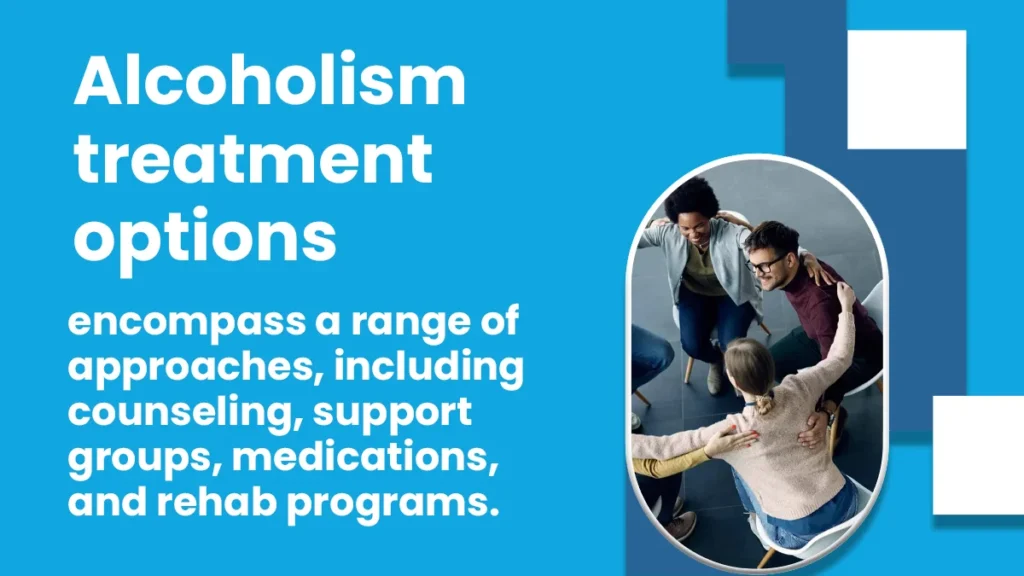Alcoholism, a prevalent issue in the United States, is a chronic medical condition marked by a person’s inability to control their drinking habits, leading to adverse consequences on their health, relationships, and daily life. It can affect people of all ages and backgrounds.
Fortunately, there is hope and support for those seeking recovery from alcoholism. An array of effective treatment options is available to meet diverse needs. This article will delve into these approaches, aiming to help individuals break free from the grips of alcohol addiction. Read on!
Key Takeaways
Alcoholism is a prevalent issue in the US, but various treatment options exist for recovery. Here is what you need to know:
- Alcoholism is a condition where individuals struggle to control their drinking, impacting physical and mental health.
- Recognizing physical, mental, and behavioral signs is essential in determining when medical care for alcoholism is needed.
- Various evidence-based treatments are available to overcome a drinking problem, such as alcohol detox and rehab programs.
Reclaim your life from substance use disorder (SUD); contact The Haven Detox-New England today at (844) 933-4145 for personalized support.

Understanding Alcoholism
Alcoholism, or alcohol use disorder (AUD), is a chronic disease characterized by an uncontrollable and excessive consumption of alcoholic drinks, leading to physical and psychological dependence. It’s not solely a result of weak willpower but involves the complex interplay of genetic, psychological, and environmental factors.
Genetics plays a significant part, as those with a family history of alcoholism have a higher predisposition. Psychological factors like stress, trauma, or mental health conditions like anxiety and depression can contribute, as some may turn to alcohol as a coping mechanism. Environmental cues, including early exposure to alcohol or societal acceptance of heavy drinking, also contribute.
The progression of alcoholism typically involves stages. Initially, it might start as occasional drinking, but over time, alcohol tolerance builds, leading to increased consumption to achieve the same effects. Eventually, control over drinking diminishes, and the individual continues to drink despite negative consequences in relationships, work, or health.
Acceptance of the problem and seeking professional help are essential steps towards recovery from alcohol misuse and dependence. It’s a journey that requires dedication, but with support and determination, many individuals successfully overcome alcoholism and regain control of their lives.
When to Seek Help for Alcoholism: Signs and Symptoms
Seeking help for alcoholism is crucial for individuals struggling with alcohol abuse or dependence. Recognizing the signs is an essential step. Here are some indications that may suggest it’s time to seek medical help:
Physical Signs
Alcoholism can manifest physically through various indicators like:
- Tolerance: Needing more alcohol to achieve the same effects.
- Withdrawal Symptoms: Experiencing physical or emotional discomfort when not drinking.
- Increased Quantity and Frequency: Drinking larger amounts or more frequently than intended.
- Blackouts: Memory loss or gaps in memory during or after drinking episodes.
- Physical Health Issues: Unexplained health problems related to alcohol consumption, such as liver damage, cardiovascular issues, or gastrointestinal problems.
- Neglect of Personal Hygiene: Decline in grooming habits and personal care.
- Weight Changes: Unexplained weight loss or gain.
Psychological Signs
The psychological signs of alcohol dependence include:
- Cravings: Strong urges or desires to drink.
- Loss of Control: Inability to limit or stop drinking despite wanting to.
- Depression or Anxiety: Worsening mental health conditions or the development of new psychological symptoms.
- Denial: Minimizing or denying the extent of alcohol-related problems.
- Isolation: Withdrawing from family, friends, and social activities.
- Preoccupation with Alcohol: Spending a significant amount of time thinking about, obtaining, or recovering from alcohol use.
- Escalating Use: Progressing from occasional to regular and excessive drinking.
Behavioral Signs
Observable changes in actions and habits can indicate the presence of alcoholism, such as:
- Neglecting Responsibilities: Failing to fulfill work, school, or family obligations due to alcohol use.
- Legal Issues: Involvement in legal problems related to alcohol use, such as DUI arrests.
- Relationship Strain: Problems in personal and professional relationships due to alcohol-related behavior.
- Loss of Interest: Decreased interest in hobbies or activities that were once enjoyable.
- Failed Efforts to Quit: Unsuccessful attempts to cut down or quit drinking.
- Secretive Behavior: Hiding the extent of one’s alcohol consumption or making excuses for it.
- Continued Use Despite Negative Consequences: Persisting in drinking alcohol despite experiencing adverse effects on health, relationships, or overall well-being.
When these signs become noticeable or affect daily life significantly, seeking professional help is strongly recommended. This could involve reaching out to a health professional, medical doctor, therapist, counselor, or 12-step programs to address alcohol dependence.
Effective Treatment Options
Alcoholism treatment involves a multi-faceted approach addressing both physical and psychological aspects. Here are several effective treatment programs and strategies:
Medical Detoxification
The important first step in treating alcoholism is often medical detox. This process involves carefully managing withdrawal symptoms under medical supervision. Detoxification helps individuals safely eliminate alcohol from their system and prepares them for further treatment.
Inpatient Rehab
Inpatient rehab programs offer a structured and supportive space for individuals recovering from alcoholism. These programs usually involve a combination of one-on-one and group therapy, educational sessions, and activities aimed at addressing the physical and psychological aspects of addiction.
Outpatient Rehab
Outpatient rehab is a flexible addiction treatment option that allows individuals to receive therapy and support while living at home. An outpatient program is suitable for those with less severe alcohol problems or for individuals who have completed inpatient rehab but still need ongoing care.
Behavioral Therapies
Behavioral therapies play a vital part in alcohol treatment by addressing the psychological components of addiction. Cognitive-behavioral therapy (CBT), motivational enhancement therapy (MET), and motivational interviewing (MI) are among the effective therapeutic approaches. These behavioral treatments help people identify and change unhealthy behaviors, thought patterns, and triggers related to alcohol use.
Medication-Assisted Treatment (MAT)
Medications can be a valuable component of the treatment of alcohol use disorder (AUD). Medication-assisted treatment (MAT) involves the use of FDA-approved medicines, such as disulfiram, naltrexone, and acamprosate, to help individuals reduce cravings, maintain sobriety, and manage the psychological aspects of addiction.
Support Groups
Participation in mutual support groups, such as Alcoholics Anonymous (AA), provides individuals with a sense of community and understanding. These groups provide:
- A non-judgmental platform for sharing experiences.
- Providing mutual support.
- Reinforcing the principles of recovery through the Twelve Steps.
Family Therapy
Alcoholism often affects not only the individual but also their family members. Family therapy helps address interpersonal issues, improve communication, and involve loved ones in recovery. It promotes a supportive environment that enhances the chances of long-term sobriety.
Holistic Therapies
Holistic therapies focus on treating the whole person – mind, body, and spirit. Practices such as yoga, meditation, acupuncture, and art therapy can complement traditional treatment approaches by promoting overall well-being and aiding in stress management.
Lifestyle Changes
Adopting a healthier lifestyle is essential for sustained recovery. Encouraging exercise, proper nutrition, and regular sleep can contribute to physical and mental well-being. Establishing positive habits reinforces the commitment to sobriety and helps individuals build a fulfilling life without alcohol.
Remember, the treatment of alcoholism is not a one-size-fits-all approach. Each individual’s recovery journey is unique; therefore, combining these treatment options, tailored to specific needs, enhances the likelihood of successful rehab.
Frequently Asked Questions (FAQ)
How long does an alcoholism treatment usually last?
The duration of alcoholism treatment varies based on individual needs and the chosen program. Typically, treatment can range from a few weeks for detoxification to several months for comprehensive inpatient or outpatient rehabilitation. Long-term recovery often involves ongoing support and maintenance programs.
What are the aftercare treatments for alcohol addiction?
Aftercare treatments for alcohol addiction include continued therapy sessions, participation in support groups like Alcoholics Anonymous (AA), ongoing medication if prescribed, regular medical check-ups, developing healthy lifestyle habits, and creating a strong support network to maintain sobriety and prevent relapse.
What is the treatment for alcohol addiction?
Treatment for alcohol addiction involves different options like medical detox, inpatient or outpatient rehab, behavioral therapies, medication-assisted treatment (MAT), self-help groups, holistic therapies, and lifestyle changes. The choice of treatment depends on individual needs, the severity of addiction, and the recommendations of healthcare professionals.
The Haven Detox-New England: Your Partner in Recovery
Are you feeling weighed down by alcohol? Remember, there’s hope. You hold incredible strength within to conquer this. At The Haven Detox-New England, we’re here to guide you toward a brighter path.
Our support begins with a medical detox program, cleansing your body from those harmful toxins. Get comprehensive care with our residential program, round-the-clock. If mental health challenges are part of your struggle, our dual diagnosis program is tailor-made for you.
Contact (844) 933-4145 and take that first step towards breaking free from alcohol’s hold. Remember, nothing’s lost, and everything’s to gain. You’ve got this.




